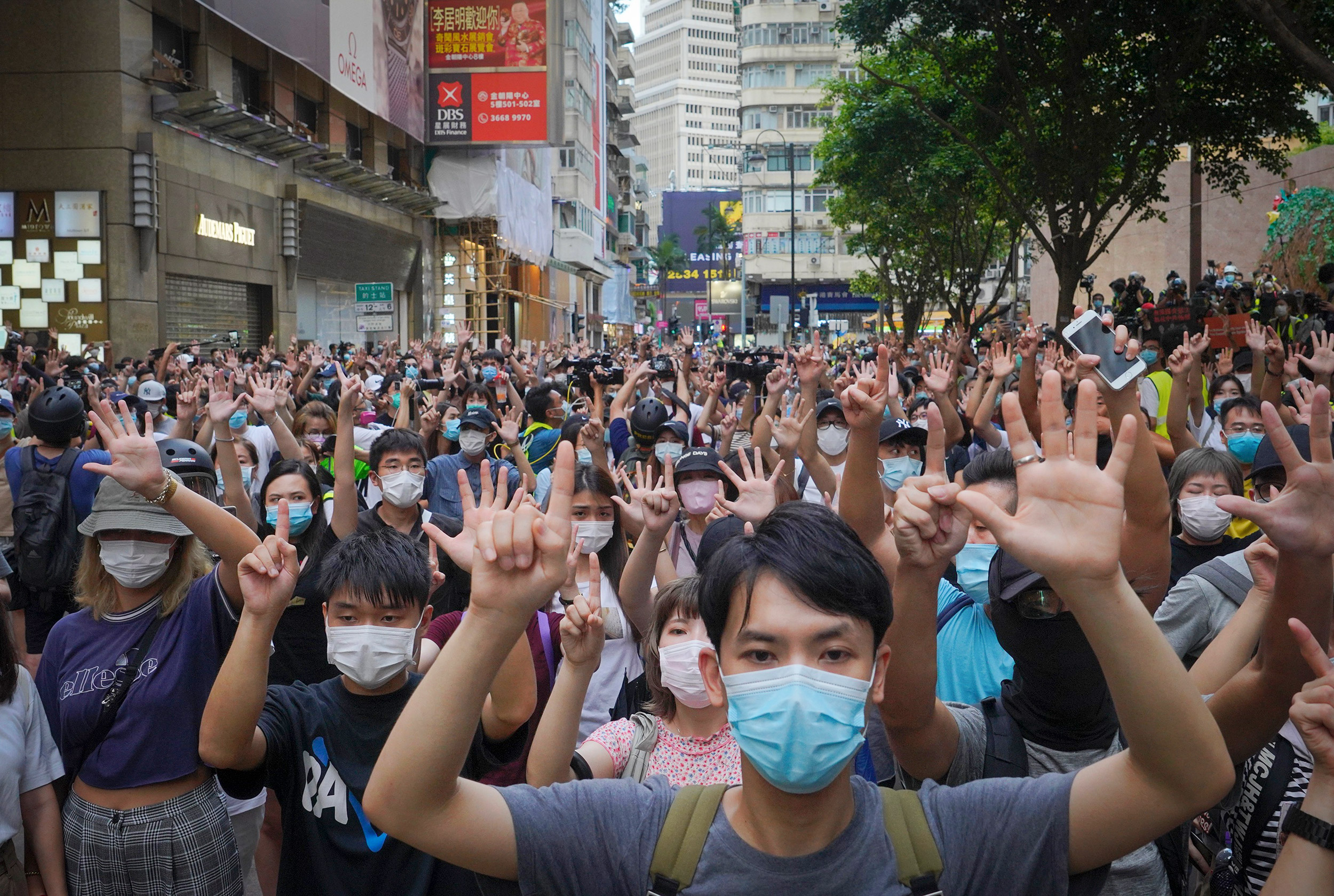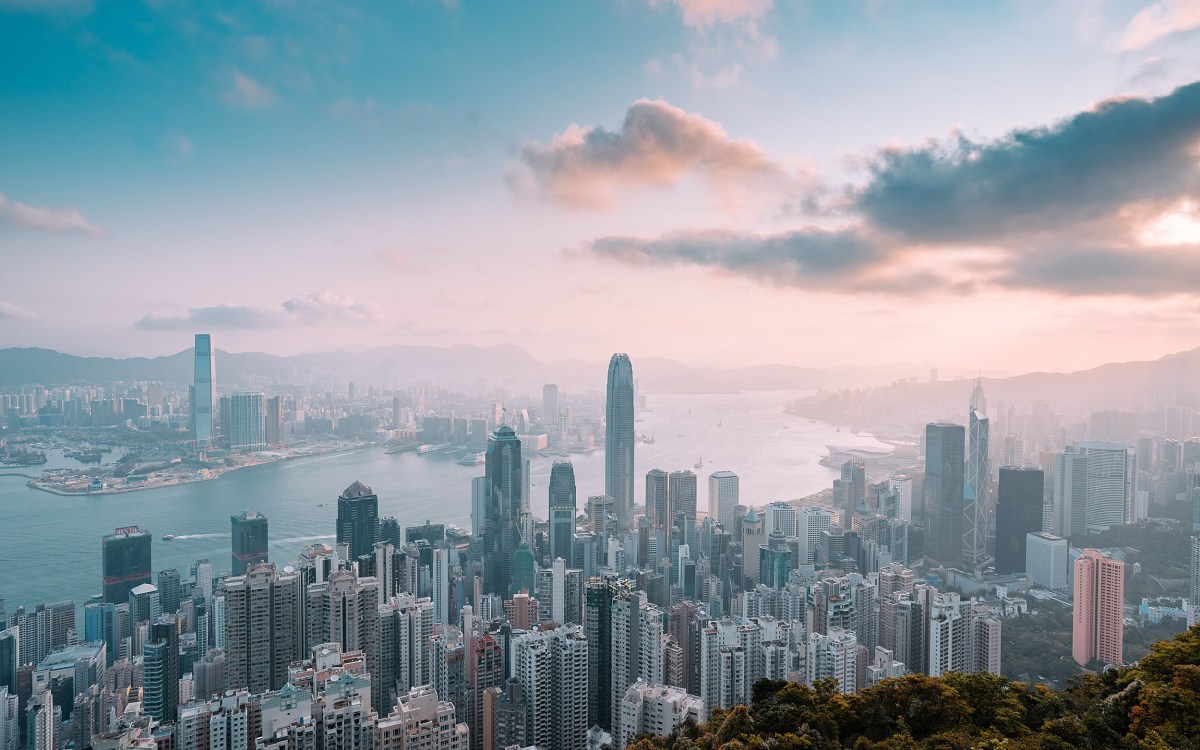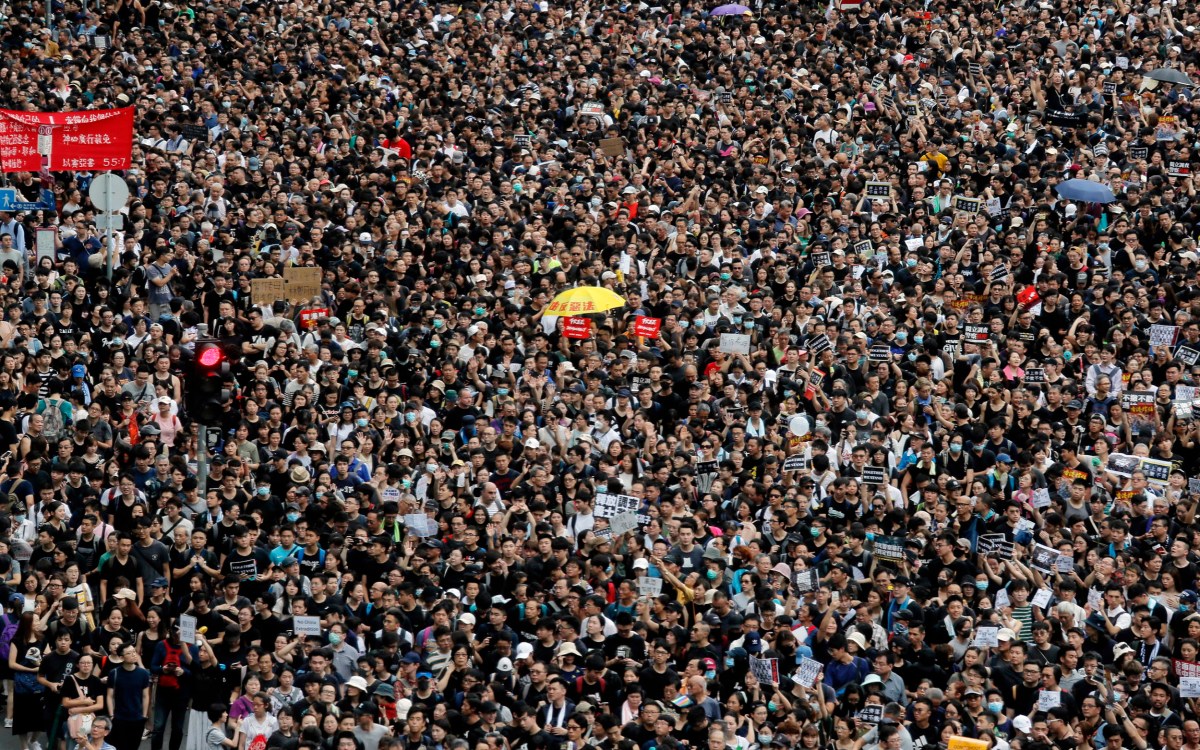
In Hong Kong, protesters against China’s sweeping new security law fill the streets. Wednesday marked the 23rd anniversary of Hong Kong’s handover to China from Britain.
AP Photo/Vincent Yu
China’s tightening leash on Hong Kong
Harvard scholar discusses what broad new security law will mean
Sweeping new national security legislation giving Chinese authorities powers to quash demonstrations and punish dissenters sparked protests in Hong Kong on Wednesday, the 23rd anniversary of the transfer of the territory from British to Chinese control. The new law, which includes 66 articles, was unveiled Tuesday evening and criminalizes any acts of secession, subversion, terrorism, and collusion with foreign powers, with a maximum sentence of life in prison. The far-reaching measure also allows Beijing to create a security agency that will have the authority to overrule Hong Kong’s legal system and enforce the new rules. The move has raised questions about the fate of the semiautonomous territory and global financial hub whose political and economic freedoms were guaranteed by a transition agreement between Britain and China that runs until 2047. The Gazette spoke with James Robson, the James C. Kralik and Yunli Lou Professor of East Asian Studies and director of the Harvard University Asia Center, about what the future holds for Hong Kong under the new law.
Q&A
James Robson
GAZETTE: Do you think this is the end of liberty and self-governance in Hong Kong?
ROBSON: This new national security law certainly looks like a substantial threat to the autonomy of Hong Kong as Beijing asserts more control. The specifics of the new law should be understood in the context of previous protest movements that occurred, for example, in 2003, 2012, the “Umbrella Movement” of 2014, and of course the massive protests of 2019. All of those had achieved some success in countering mainland attempts to have greater influence in Hong Kong. Based on a quick reading of the new law, which came out on the eve of July 1, traditionally a day of large public gatherings, it is directed at ensuring there is not a repeat of what attracted worldwide attention exactly a year ago. You had millions of people peacefully protesting in the streets, but then you began to see increasingly violent incidents. If you think back, a year ago today was the storming of the Legislative Council Complex in Hong Kong, a protest that really changed the tenor of things.
GAZETTE: What was the stated rationale for the move?
ROBSON: So, from the Chinese perspective, and I think even in terms of what [Hong Kong chief executive] Carrie Lam herself has been saying, this new legislation is being portrayed as an attempt to restore law and order. That violence, in other words, has been used as a pretense for this new national security law. The new law specifically bans things like subversion, sedition, and collusion with foreign governments (who were alleged to have fanned the flames of violence). Ostensibly the law is directed at the most violent and radical protesters, especially those advocating independence, but the language is so vague that there is a palpable fear that it will be applied generally and broadly. The issue is what the interpretation of those acts will be once these appear as cases in the court system. It could be that even small acts like peacefully carrying a sign are punished severely. I think the first arrest made after the law was announced was someone who was just displaying a poster advocating Hong Kong independence. The new law will be chilling for civil protest movements and mass mobilizations, and it will also have knock-on effects for the independent free press (some journalists are already asking to have their previous publications erased), the publishing industry, higher education, the use of social media, and the rule of law in Hong Kong.

GAZETTE: Is there any outside power that might be able to sway China in terms of its actions in Hong Kong, or are Beijing officials unconcerned with what other nations think?
ROBSON: That’s a really good question. I think it would be very unlikely for them to be swayed. I read a striking quote by Zhang Xiaoming, deputy chief of the Hong Kong and Macau Affairs Office, who said: “No one knows better than us how to cherish” the current accord, dubbed One Country, Two Systems. “What does this have to do with [them]? … The time that the Chinese people have to please others has passed.” I thought that was really telling. Not to mention there has already been some outside pressure. The U.S. has spoken up (rather tepidly); the E.U. has spoken up. Canada has weighed in because this is deeply connected to the Huawei extradition case and the Canadians who have now been tried. And it seems nothing has had any suasion on China. Still, there is a kind of regional and global response. The U.K. has said it would take in some 3 million people from Hong Kong, allowing them to work under special visas. Japan has also attempted to attract foreign professionals and specialized workers from Hong Kong by loosening up regulations on the path to permanent residency in a bid to make Japan a financial hub in Asia. South Korea and Singapore are also hoping to establish themselves as new financial centers. Taiwan is also another important player here that has also opened its doors to people from Hong Kong.
GAZETTE: You mention Taiwan, considered a breakaway province by China that it ultimately wants to bring back under its control. How do you see this new security rule affecting Taiwan?
ROBSON: At the Harvard Asia Center last year we ran a large panel discussion about the Hong Kong protests, “Repercussions: The Hong Kong Protests in Context,” and Steven Goldstein (an associate at the Fairbank Center for Chinese Studies) spoke to the very quick impact that the response to those protests had in Taiwan on their elections. Basically, it changed the whole dynamic in Taiwan. And so Taiwan is looking at Hong Kong and looking at itself and thinking about what its future is going to be and how it will maintain its democracy. So I think there’s inevitably going to be some kind of impact within Taiwan on domestic politics, vis-à-vis Hong Kong.
GAZETTE: What kind of additional reaction could you anticipate from the United States?
ROBSON: United States Secretary of State Mike Pompeo has come out and denounced this, particularly the issues of an independent kind of judiciary and rule of law, and the U.S. has suspended the regulations affording preferential economic treatment to Hong Kong over China. At the same time, members of the Trump administration are probably having to think very long and hard about how to respond in the face of escalating problems in the U.S.-China relationship writ large, in particular what they’re trying to do with the trade agreement and what the long-term impact of that is going to be. So, I think they’re really in a hard place in terms of how to negotiate this, but there does not seem to be much will to challenge China on human rights and democracy in Hong Kong. Some in Congress have, however, tried to introduce legislation that will allow skilled professionals from Hong Kong to enter the United States.
GAZETTE: Hong Kong has long had a reputation as a global financial hub. How will this new rule of law affect that?
ROBSON: When you had the handover in 1997 there was quite a reaction in terms of people moving to new countries; there was a major exodus. But then, for some time, it seemed as if things were going along pretty well and that Hong Kong had maintained its financial stature. I think the protests last year started to call some of that into question. I sense there are going to be new efforts by some people to leave Hong Kong. I’m not a specialist of the business world, but I think that once the ability to operate in a place that had such beneficial structures for financial institutions is called into question, the business community will begin to vote with its feet and move out. We saw some of that last year. I remember during those protests seeing reports of substantial sums of capital that were being moved out of Hong Kong to Singapore, to Korea, and to Japan as well. The new moves by those countries to set themselves up as financial centers signal longer-term challenges for Hong Kong.
GAZETTE: How do you see this new crackdown affecting young people in Hong Kong?
ROBSON: Young people in Hong Kong are going to be hitting midlife right at the time when the final handover and transition is set to happen in 2047, and they are seeing a very bleak future or no future at all for themselves. They’re in a complete transformation of life and that, I think, has caused some real sense of despair and perhaps even a kind of desperation to try to act now to do something to ensure certain types of liberties for themselves. This is also going to have a discernible ripple effect on universities, their academic freedom, and their ability to teach particular subjects and how they teach them. As far as I understand the law, it has the potential to influence the content of what’s being taught at universities, which really does look to be an attempt to try to control intellectual freedom.
GAZETTE: Do you think that the threat of that kind of brain drain could make Beijing change course?
ROBSON: My quick answer to that is that no. We’ve seen how Beijing or the Chinese government responds after instituting certain types of measures, even amid substantial protests or critique. For example, the condemnation of the situation of the detention of more than a million Muslims, predominantly Uighurs, in western China. If that doesn’t put pressure on them to make any changes, then then I think something like this would be very unlikely to. In addition, some are trying to argue that this is going to create opportunities for Hong Kong because they see this new legislation as restoring law and order to the streets of Hong Kong, and they see it as a new opportunity for Hong Kong to be successful and grow. I personally find that to be a rather skewed view.
GAZETTE: How do you think the people of Hong Kong will adapt to these new restrictions?
ROBSON: I will be really interested to see what happens over the next days, weeks, months, even years perhaps, and watch the creativity in terms of the response to this new law. While there have been some immediate adaptations by those who have dismantled political parties, deleted their social media accounts, and curtailed their participation in public protests, one of the things that’s really impressed me over the years of the protest movements in Hong Kong, and also even small-scale ones in China, is the creativity of the youth who come up with things that are totally unexpected by the authorities. And so watching how that creativity comes about, and then seeing what that dynamic looks like, will be interesting. We may even see a new round of protests. If the protests stay peaceful, they have a better chance of making an impact. I do fear the effect these new laws will have on the different mechanisms of civil society in terms of the ability for protest groups, NGOs, and others, to really operate, even through peaceful protests, without quickly falling into the trap of these vague laws that can be interpreted such that small things can be considered seditious or subversive acts that lead to long prison terms. Even more insidiously, I wonder what’s going to be happening in the court system. That element is particularly disconcerting, since this new law appears to threaten the independence of the judiciary and the rule of law in Hong Kong.
Interview was lightly edited for clarity and length.






